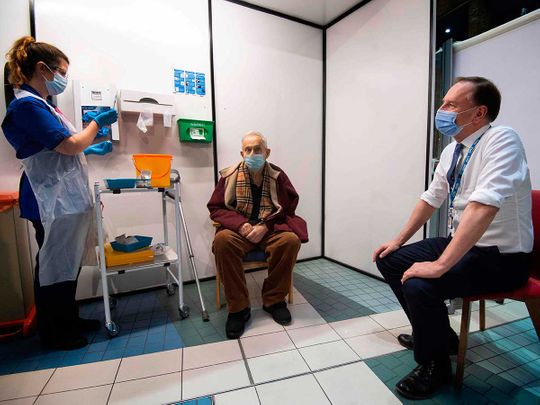
London: Britain is on a pace to give the first shot of a two-dose coronavirus vaccine to its entire population by the end of June, if it can avoid supply and logistical issues that threaten to slow one of the world’s fastest rollouts.
The most vulnerable will get their first doses much sooner - likely over the next two weeks - which could sharply reduce deaths. People over 70, care home residents and workers, health and social care workers, and those whose health problems make them extremely vulnerable are all on schedule to receive their first vaccine shots before Feb. 15. Together these groups have accounted for 88 per cent of all COVID-19 deaths.
The timeline shows the promise of vaccination as a path out of the deadliest stage of the pandemic in the countries that are moving quickly. Early data out of Israel shows a significant drop in infection after just one shot, and a recent analysis suggested that the AstraZeneca-Oxford vaccine not only provides good protection against illness and death but also has potential to reduce transmission of the virus. Scientists have said the results are promising but must still be confirmed.
As of Wednesday, the UK had vaccinated over 15% of its population, more than anywhere in the world aside from Israel and the United Arab Emirates. The United States was over 8 per cent, and the European Union was below 3 per cent.
Of course Britain’s vaccine rollout is unlikely to follow a perfectly straight line. A vaccine war with the European Union may jeopardize the supply of vaccines, and the country’s decision to deliver more first doses while delaying doses of the second shot could create a backlog of patients.
“The first jab is the easiest to get going; the second is more difficult,” said Kit Yates, a mathematical biologist at the University of Bath. “When we go back for the second doses, we have to do it in the right order, and that is a piece of bureaucracy that could potentially slow things down.”
If the current pace of vaccination in Britain were to slow down by 20%, it would then take until the end of July to vaccinate everyone.
So far, the country’s rapid vaccine rollout has been heralded as a success. Britain moved faster than any Western nation to authorize the Pfizer-BioNTech vaccine in early December and the AstraZeneca-Oxford shot in late December, and it began vaccinating health care workers and the elderly December 8. Over the last two weeks the country has administered an average of 394,000 doses each day.
The pace of vaccinations has also been helped along by conducting the campaign through the highly centralised National Health Service, which covers all Britons and delivers most of the country’s health care. And in addition to Britain’s relatively fast vaccine approval process, the country moved more aggressively than the European Union, ordering large quantities of vaccines several months before they were approved.
“It’s a hedging your bet strategy,” said Yates. “We’ve bought huge doses of vaccines on the off chance some of them won’t work.”
The British government has now ordered 407 million doses from seven manufacturers - about six per person in the country - although only three of the vaccines are currently approved for use. Some of the deals will see the supply of vaccines delivered in the second half of 2021 or even next year.
It was only last week that the country surpassed the grim milestone of 100,000 COVID-19 deaths, by far the highest toll in Europe. But the success of the vaccine rollout so far provides hope that Britain’s most vulnerable are being protected and that the number of COVID-related deaths will drop significantly in the weeks ahead.












